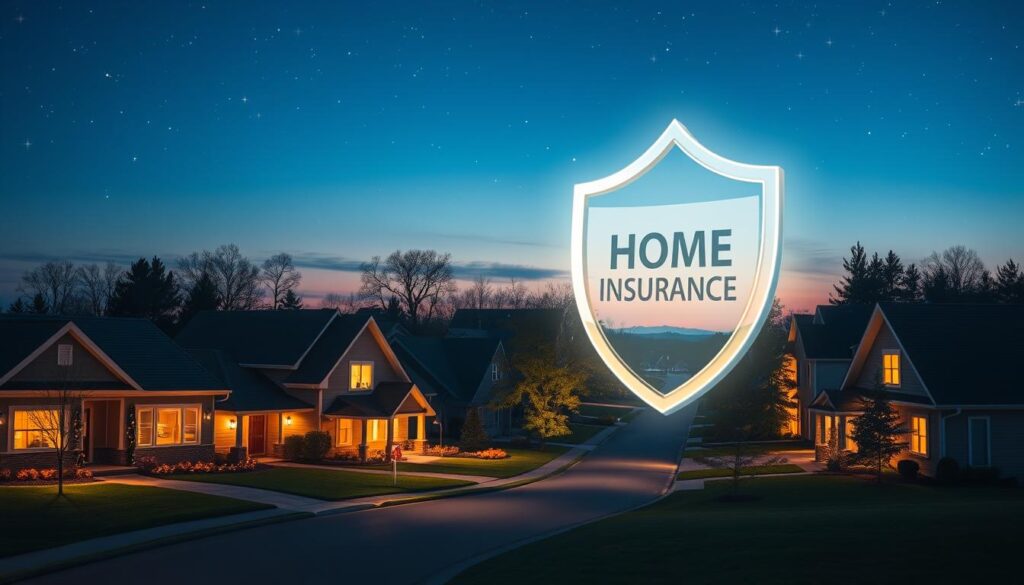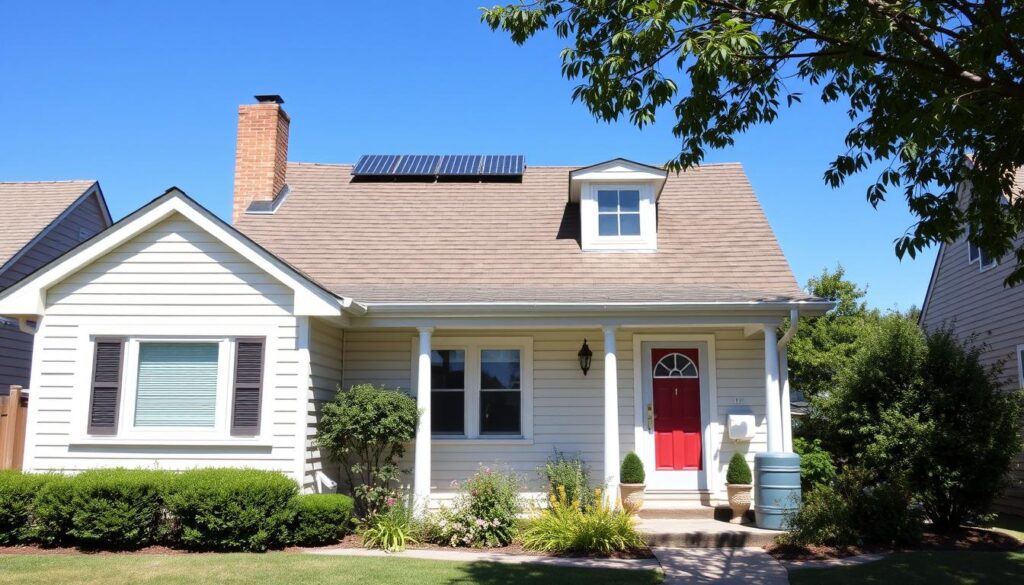As the world changes fast, keeping up with home insurance is key. In 2025, a smart tip could save you a lot on insurance. This article will show you how to save money on your home insurance. It covers hidden costs, trends, and smart ways to protect your home.
Key Takeaways
- Discover the hidden factors that inflate home insurance premiums and learn how to combat them.
- Gain insights into the industry’s pricing trends for 2025 and position yourself for cost-effective coverage.
- Leverage smart home technology to unlock discounts and lower your insurance costs.
- Explore lesser-known discounts that insurance companies don’t actively promote.
- Optimize your deductibles and policy exclusions for long-term savings.
Understanding the Hidden Costs of Home Insurance Premiums
Home insurance premiums can be affected by more than just basic coverage. It’s important for homeowners to know about these «hidden» costs. This knowledge helps them save money on their insurance.
Common Premium Inflating Factors
Location, home age, and claims history are key factors that can increase your premiums. Homes in areas with natural disasters, like hurricanes or wildfires, cost more. Older homes might need special coverage, which raises the price.
Also, a history of claims can make insurers think your home is riskier. This can lead to higher premiums.
Industry Pricing Trends for 2025
Experts say home insurance premiums will go up in the next few years. This is because of climate change and rising construction and labor costs. You can expect big price differences in different areas.
Regional Cost Variations
Home insurance costs vary a lot across the U.S. Weather, housing market, and local building codes play a big role. Coastal areas and places at risk for natural disasters have the highest premiums. But, areas with milder weather and lower risk might have lower rates.
| Region | Average Annual Premium (2025 Projection) |
|---|---|
| Northeast | $1,500 |
| Southeast | $2,000 |
| Midwest | $1,200 |
| West | $1,800 |
«Understanding the hidden costs of home insurance premiums is crucial for homeowners who want to maximize their savings and protect their investments.»
The Game-Changing Bundling Strategy Revealed
Many homeowners don’t know about the power of policy bundling in home insurance. Bundling means combining home and auto insurance into one package. This can lead to big savings, making it a smart move for those who know about it.
One big plus of bundling is saving money. You can get discounts of 10% to 25% by bundling your policies. This not only makes managing your insurance easier but also lowers your costs.
| Policy Type | Average Annual Premium | Bundled Discount | Annual Savings |
|---|---|---|---|
| Home Insurance | $1,200 | 15% | $180 |
| Auto Insurance | $1,500 | 20% | $300 |
| Total | $2,700 | N/A | $480 |
When looking at bundling, think about what you need, the provider’s reputation, and customer service. The savings are great, but make sure the policy fits your needs.
To get the most from bundling, try these tips:
- Check if your current provider offers bundling discounts. Many do.
- Get quotes from different insurers to find the best deal.
- Talk to your provider to get the best bundling offer, using your loyalty and claims history.
By using insurance bundling, you can save a lot and make managing your insurance easier. This strategy is a must-try for homeowners wanting to save money and get better coverage.
Smart Home Technology: Your Secret Weapon for Lower Premiums
Smart home technology is changing the game in home insurance. Adding smart devices to your home can save you a lot on insurance. From top security systems to smart smoke detectors, the right setup can lower your costs.
Top-Rated Security Systems
Insurers love smart home security. A good security system can get you big discounts. Systems that alert you instantly show your home is safe, leading to lower premiums.
Water Leak Detection Devices
- IoT-enabled water leak detection devices are a big deal in home insurance.
- They spot water leaks early, preventing damage and claims. This can get you discounts.
Smart Smoke Detectors
Smart smoke detectors also help lower your premiums. They warn of fires early and can be monitored remotely. Insurers see them as a big plus, offering discounts.
| Smart Home Device | Potential Insurance Discount |
|---|---|
| Security System | Up to 20% |
| Water Leak Detection | Up to 10% |
| Smart Smoke Detectors | Up to 5% |
Smart home tech makes your home safer and saves you money on insurance. As insurance changes, smart homes will be key to saving money.
Home Insurance Tips for 2024 in the US
As we get ready for the new year, it’s a great time for US homeowners to check their insurance. They should make sure they have the best coverage and value. Here are some key 2024 insurance advice tips to improve your US home coverage and insurance optimization:
- Do an Annual Policy Review: Take time to review your home insurance policy. Check for any gaps or changes in your needs. This helps you save money or get better protection.
- Look at Bundling Deals: Bundling your home insurance with other policies can save a lot of money. Compare quotes to find the best deals.
- Use Smart Home Technology: Smart home devices like security systems and water leak detectors can make your home safer. They can also get you discounts on insurance.
- Adjust Your Deductibles: Find the right deductible level for you. It’s a good way to save money over time.
- Keep Up with Trends: Watch for new technologies and changes in the insurance world. Being ahead of these changes can help you save money.
By following these 2024 insurance advice tips, US homeowners can get the right coverage. They can also save money and feel more secure in the coming year.
| Insurance Tip | Potential Impact |
|---|---|
| Annual Policy Review | Identify coverage gaps and cost-saving opportunities |
| Bundling Strategies | Achieve significant discounts on premiums |
| Smart Home Technology | Qualify for insurance discounts while enhancing home safety |
| Deductible Optimization | Balance lower premiums with manageable out-of-pocket costs |
| Staying Informed on Trends | Proactively adapt to industry changes for better coverage and savings |
By using these strategies, homeowners can optimize their insurance coverage and costs in the US market for 2024 and beyond.

Maximizing Deductibles for Long-Term Savings
Homeowners can cut their insurance costs by raising their deductibles. This simple step can lead to big savings over time. It’s all about finding the right balance between risk and savings.
Risk Assessment Strategies
Start by checking how much risk you’re willing to take. Think about your financial health, how likely you are to file a claim, and if you can afford the deductible. Knowing your risk helps you choose the right deductible.
Calculating Optimal Deductible Levels
After assessing your risk, it’s time to look at the numbers. Check your past claims, repair costs in your area, and how much you can save with higher deductibles. This will show you the best deductible for saving money without risking too much.
It’s all about finding the right mix of insurance deductibles, risk assessment, and premium reduction. By carefully choosing, you can save money and get insurance that fits your needs.
Lesser-Known Discounts Insurance Companies Don’t Advertise
When looking for home insurance, it’s easy to miss out on big savings. Insurance companies often don’t talk about these discounts. But, with a little effort, you can find many policy perks.
One discount you might miss is the loyalty discount. Many companies give a discount to long-time customers. This can save you a lot on your annual premium. Always ask about this when you renew.
Another discount is for professional association members. If you’re part of a trade union or industry group, you might get a special rate. These discounts can add up fast. So, tell your agent about any memberships you have.
Lastly, ask about lifestyle-based discounts. Some insurers offer savings for good credit, home security, or certain jobs. These hidden insurance discounts might not be well-known. But, they can make a big difference in your savings opportunities.
«The key to unlocking these policy perks is to ask questions and do your research. Don’t be afraid to inquire about any and all potential discounts that may apply to your unique situation.»
Exploring these hidden insurance discounts can save you a lot on your home insurance. So, when you’re shopping for or renewing your policy, ask your agent about these savings opportunities. They’re often overlooked.
Home Improvement Projects That Lower Insurance Costs
Home ownership often overlooks the savings from home upgrades on insurance. By choosing the right home improvement projects, homeowners can save a lot on insurance savings. This helps protect their most valuable asset – their home.
Weather-Resistant Upgrades
In areas hit hard by severe weather, home upgrades that make a house more resilient can cut insurance costs a lot. Using impact-resistant roofing, installing hurricane shutters, or getting reinforced windows and doors can lower insurance premiums. These weather-resistant changes not only protect the home but also show insurers you’re serious about reducing risks.
Security Enhancements
Boosting a home’s security is another smart way to save on insurance. Property improvements like a strong alarm system, better locks, and motion-activated lights can lead to insurance discounts. Showing you’re serious about home safety can help you get better insurance rates.
| Upgrade | Estimated Insurance Savings |
|---|---|
| Impact-Resistant Roofing | 5-15% reduction |
| Hurricane Shutters | 8-12% reduction |
| Reinforced Windows and Doors | 3-7% reduction |
| Alarm System Installation | 2-10% reduction |
By carefully planning and doing these home upgrades, homeowners can make their homes safer and more resilient. They also get to save a lot on insurance savings over time.

Navigating Policy Exclusions and Riders
Buying a good home insurance policy is key, but knowing the details is just as important. Many homeowners don’t know about insurance exclusions and coverage gaps. These can lead to big financial losses. By learning about these exclusions and adding policy riders, you can protect your home better.
One big exclusion is damage from flooding. If you live in a flood area, you might need a flood insurance policy. Also, valuable items like jewelry or art might not be covered. You can add personal property riders for these items.
- Earthquakes, landslides, or sinkholes might not be covered by standard policies.
- Home insurance often doesn’t cover regular wear and tear or pest damage.
- Some policies don’t cover certain dog breeds or home businesses.
Knowing about exclusions and policy riders lets homeowners customize their coverage. This way, they can be ready for unexpected events or losses. It’s a smart move to protect your finances.
«Knowing your policy exclusions and riders can mean the difference between a minor inconvenience and a financial disaster when disaster strikes.»
Annual Policy Review: A Money-Saving Must
It’s important to keep your home insurance policy up-to-date. This ensures you have the right coverage at a good price. An annual review can help you save money and stay informed about insurance changes.
Coverage Gap Analysis
Start by checking if your policy still fits your needs. Have you made changes to your home or bought new things that need coverage? Look for any gaps in your policy that could leave you exposed. This way, you can adjust your policy with your insurer.
Market Comparison Techniques
After checking your coverage, compare quotes from different insurers. Look at deductibles, discounts, and if you can save by bundling policies. Also, check if prices vary by region, which could affect your area.
| Insurer | Annual Premium | Deductible | Discounts |
|---|---|---|---|
| ABC Insurance | $1,200 | $500 | Bundle, Home Security |
| XYZ Insurance | $1,100 | $1,000 | Bundle, Loyalty |
| Coastal Insurance | $1,400 | $750 | Home Upgrades |
By doing an annual insurance policy review, you can find gaps in coverage. You’ll also learn about the latest coverage updates and find the best market comparison. This ensures you get the most value for your home insurance.
The Impact of Credit Score on Insurance Rates
Your credit score can greatly affect your home insurance rates. This is because many insurers use credit scores to set premiums. They see your credit score as a sign of your financial health and risk level.
Insurers believe people with good credit scores are less likely to make claims. This makes them lower-risk customers. So, those with better credit might get lower rates, while those with lower scores could pay more.
Improving your credit score can help you get better insurance rates. You can do this by paying bills on time, keeping low credit balances, and fixing any credit report errors. Knowing how credit scores impact insurance can help you save money.




